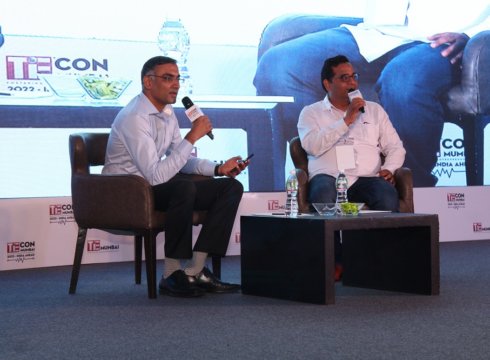Inc42 Daily Brief
Stay Ahead With Daily News & Analysis on India’s Tech & Startup Economy
“Whatever we (entrepreneurs) do on our smartphones today, everyone else will end up doing it eventually,” stated Paytm CEO and founder, Vijay Shekhar Sharma at a fireside chat with Anand Lunia, Founding Partner of India Quotient during TieCON Mumbai 2017. The chat covered a spectrum of subjects such as the pain of starting up, a few nuggets on the Paytm journey and the all-important role that tech startups are going to play in the next few years.
The intimate tete-a-tete started off with Anand quizzing Vijay on what makes a good entrepreneur great in today’s ecosystem, where valuations have become more realistic and investors are not easily swayed by just the next big idea. Vijay replied by reiterating the point made by serial entrepreneur Bill Gross: timing is everything.
He revealed that Paytm’s Payments Bank license was not even the first or second one, it was number 33 on the list to be sanctioned a license by the RBI, but the timing of it mattered in making it a reality. Taking the point a step further, he mentioned that a clear demarcation of founding roles is required within a company in order for it to execute successfully.
Here, he mentioned an incident from before he founded One97 Communications – Paytm’s parent company, where he’d joined a successful bunch of entrepreneurs who couldn’t buy into the same vision for their venture and so couldn’t make it work.
On Business Models, Mentorship, And (Ad)venture Capital
Anand then mentioned the conventional wisdom of startups picking a business model such as B2C or B2B and sticking with it because it made revenue. But Vijay was all for challenging the status quo, something he had done by starting up a B2C model such as Paytm after running One97 in the B2B space.
As he said, “Between B2B and B2C, the challenges are different – in B2C, the infrastructure needed has to be built from the ground. There is no money coming in the first three to five years, if you’re very lucky, and everything comes down to costs – paying employees, paying for customers, paying for marketing. With B2B, revenue is easier to track and it is all about catching low-hanging fruit. It’s not as high-risk, high-reward as B2C is.”
Vijay then took the opportunity to turn the tables around on Anand, and prompted a discussion on defining venture capital as it exists today.
He classified existing VCs as either need-of-the-hour adventure capitalists – those who were willing to back the dream of an entrepreneur before counting ROI. And the vulture capitalists, who only went after the bottom line. To which Anand replied, “The VC game is all about the food chain – big money (PE funds) eats small money. And, if asked, India Quotient, we are vulture capital too, in that we have to assess the merit of ROI versus how enthusiastic about the idea – we are in the business of making money at the end of the day.”
On the subject of mentoring, Vijay was candid enough to admit that mentoring is a zero sum game. “If you’re a hero, everyone wants to mentor you, hitch their wagon to your idea. But when you’re a zero, you deal with it alone.”
He also made some valid points regarding the Arunabh Kumar sexual harassment row where he firmly opined that it was not a startup problem, but a workplace culture problem. He placed the onus of making the workplace a more conducive, professional and transparent environment for women, on the management.
In The End, The Smartphone Will Become Our World
A key aspect that the chat centred upon was mobile technology, both present and what it will become in the near future. Vijay began by explaining that technology through the decades has been connected with what has been done before – the microchips of the 70s were used to build the mainframe computers in the 80s, the computers led to the dotcom era of the 90s and 2000s. In the 2010s, It Is All About The Network Age.
“How connected are we – how connected will we become, that’s the next wave of technology. Cloud, AI, machine learning, these technologies are all centred on our devices and eventually, whatever you do on the smartphone, everyone will end up doing it.” He elaborated more on this with – “These systems in the ‘aether’ will gradually take a call on our life, whether we want them to or not.”
Therefore, in this connected age, any business’s job is to first identify and understand their consumer, understand consumer behaviour and then look to influence their decision-making.
He mentioned the India Stack and how Aadhaar (UIDAI) has been successfully deployed in numerous instances easing mobile technology, in particular, while the UPI still lacked backing from the banks and general public adoption. The last factor he was insistent on was localising the product and service through language.
“We underestimate the dissemination of information at the grassroots level. And for technology and tech startups to really stand at the bleeding edge and survive – they have to keep language, the India Stack as well as the way consumer behaviour can be influenced in the ‘Network Age in mind while building for India in the next five years,” he concluded.
The conversation took place centre-stage on the first day of TieCON Mumbai 2017, is being held on March 17-18, 2017, at Lower Parel, Mumbai. The main focus of the expo is to explore possibilities for startups to cultivate emerging trends such as IoT, big data, artificial intelligence and more across traditional industries such as retail, banking, healthcare to become successful over the next five years.
Note: We at Inc42 take our ethics very seriously. More information about it can be found here.


